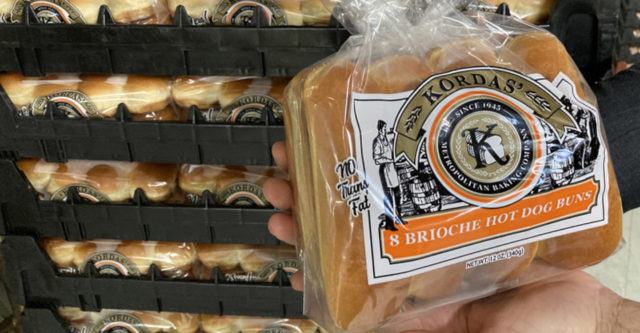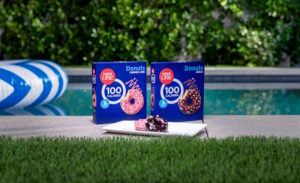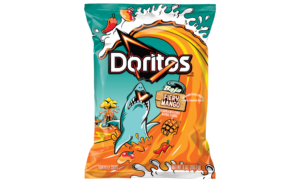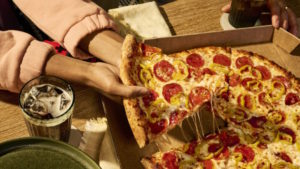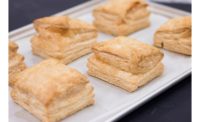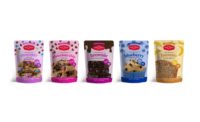The Bottom Line:
- The company will be expanding soon
- It has always been at its original location
- Products include Pullman bread, Coney Island hot dog buns, and more
Metropolitan Baking Company is a family-run business. George Kordas founded the company (located in the Detroit suburb of Hamtramck) in 1945, then passed it down to his son, James Kordas. Then, James passed it down to his son, also named George Kordas. It’s no surprise, then, that when the current George Kordas steps onto the production floor, he greets the employees by name and works to make them feel like family, too.
Humble beginnings
The original George Kordas was a Ford car salesman and was a “rock star at his job,” says his grandson George—successful enough so that he made enough money to invest in a bakery.
At the time, the bakery he chose to invest in was called Mayflower Bakery, which sat in the space that Metropolitan Baking Company occupies today. Kordas had a few partners at the time but eventually bought them out. At one point, there were 50 homes on the block, and now the Lumpkin Street block is strictly occupied by the company.
At A Glance
Key Personnel
James Kordas, chairman
George Kordas, president/CEO
Mike Zrimec, chief operating officer
Dave Bushbaker, chief financial officer
Sam Militello, production director, R&D
John Grabowski, senior maintenance engineer
“That's the beginning, but it was a much smaller kind of bakery at the time—just a few small Hamtramck homes that were connected by a mechanic's garage in the back. It was kind of a hand bakery; not automated, but he saw the potential,” notes the younger George Kordas, president, of Metropolitan Baking Company.
“[My grandfather] was a hard worker; he knew that he could put his money into almost any business and hopefully help it thrive, based on not just a few dollars being put in, but the sweat equity that he would invest himself,” he says. “My grandfather was a guy that was going to make it work. And he said, let's give it a shot.”
Family affair
Kordas technically started his career at the company on the production floor. When he was in college at the University of Colorado Boulder, he would come home during summer break and would work on the assembly lines and in the mixing rooms, loading docks, and freezers.
“It was always a unique time coming back from college, and really getting in the nitty gritty and working hard. It was always a slight shock to the system, but you learn what hard work is,” he shares.
“At that same time, throughout my summers in high school and college, I saw the opportunity that I had. My father never forced me into the company—he never said, ‘Hey, we expect you to be here at the end of [college].’ He always said, ‘We want you to carve your own path. [But] if you want to take a chance—if you want to come and see what you can do—by all means it'll be here,’” Kordas explains.
“[However], he never pressured me, and I think not feeling that pressure made me realize the immense opportunity that I actually had,” he notes.
During his junior year of college, he realized that working at the company was something he wanted to do long-term.
“I [was] excited to see if I [could] grow it the way my grandfather and my father had. I think we're doing that—which is exciting,” he adds.
Bread roster
The company started off solely making specialty breads, like cinnamon raisin, white bread, and white bread. Nowadays, it makes breads, buns, and rolls, including Pullman bread.
“Pullman bread actually gets its name from the Pullman railcar, which actually is just a square loaf of bread,” Kordas explains. “A slice of Pullman bread is going to be on club sandwiches. If you have ever eaten a club sandwich or a Texas Toast, and you have that square slice of bread, that's what a Pullman bread is. We’re one of the largest regional producers/highest volume producers of Pullman breads in this region.”
Kordas says that his father, James, ended up helping automate and add the Pullman bread line into the current facility, because it takes some extra mechanics and different automation.
“When you're eating a round top loaf of bread, it’s baked without a lid on the pan. When you're eating a Pullman bread, which is a going to be a square bread—rectangular loaf—that's going to be baked with a lid that's actually placed on and [kept on] throughout the baking process,” Kordas adds.
The company’s breads are primarily packed under the “Kordas’s Metropolitan Baking Company” name, he says.
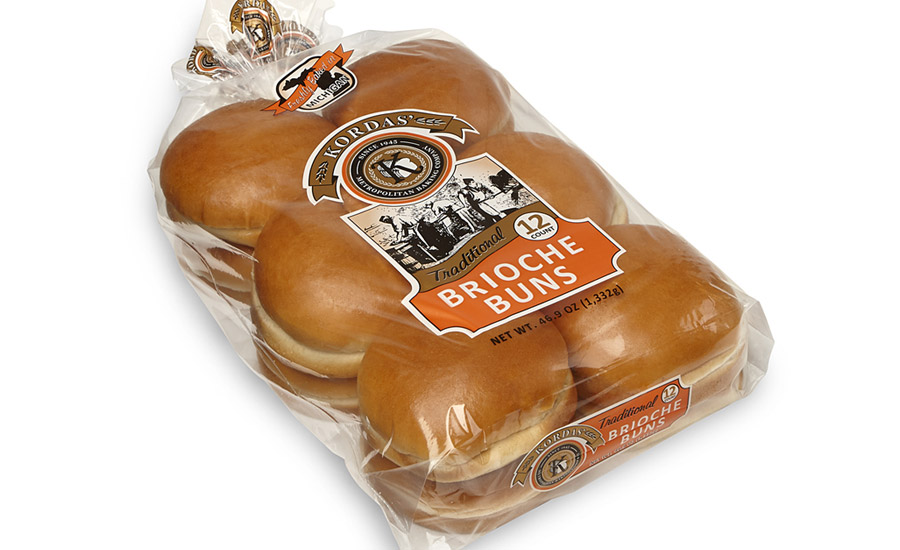
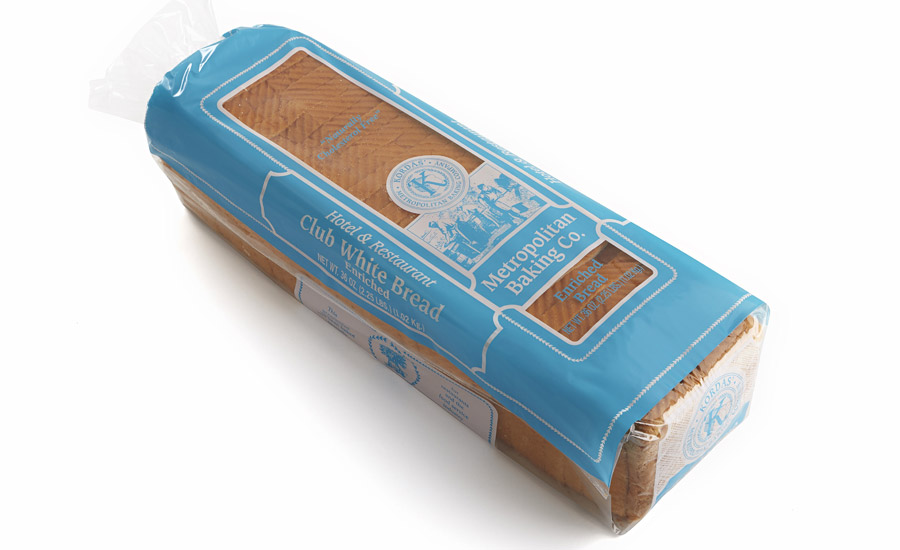
Courtesy of Metropolitan Baking Company
“Kordas is going to be the most pronounced on the label. We've also used Hearth Oven Bakers in the past, although that’s been shelved for a while. If you see the ‘K’ on the trucks, you'll know it's our product, same as with the packaging,” notes Kordas.
Around 1990 or 2000, the company ended its original bun and roll lines, and started producing hot dog buns, hamburger buns, brioche buns, and more, for restaurants all over Michigan, he says.
“One of those products is the Coney Island hot dog bun. If you're eating a Coney Island hot dog or a chili dog in Michigan, there's a good chance that [you’re eating] our product, and we take pride in that. It's kind of a neat product; it’s specially formulated for the Coney Island [locations], and we’re shipping to about 100 of those locations,” Kordas comments.
Expansion
In November 2023, the company announced expansion plans. The expansion will add 35,000 square feet to the Hamtramck property, as well as 25 new jobs.
“We've had roughly five expansions over the course of time, and it was really based on capital. My father and grandfather never wanted to extend themselves too far; they’ve always been conservative, and always wanted to be a debt-free organization. They wanted to fund the business via the family and they never wanted to take on large loans,” Kordas explains.
MOST POPULAR PRODUCTS
- Coney Island Steamer Buns (Premium Hot Dog Buns)
- Hamburger Buns
- Sub Rolls
- Texas Toast Bread
- Club White and Club Wheat Bread
- Pullman White and Pullman Wheat Bread
- Restaurant Brioche Buns
- Kaiser Rolls/Onion Rolls
- Dinner Rolls
- Cinnamon Raisin Bread
- Deli Rye Bread
-
French/Italian Bread
“A small expansion might be a 5,000- to 7,000-square-foot expansion here and there. Over the course of roughly 70 years, there were five expansions. This next expansion is going to be our largest and most aggressive, and that's going to be about 35,000 square feet. It includes new dock space and a full new bun and roll line. We're excited about it,” he shares.
At the end of the expansion, Metropolitan Baking Company’s facility will be about 140,000–150,000 square feet in total.
“We’ve slowly increased capacity over time. We got to a point where customers from all over the country wanted our products. Our frozen capabilities have increased, and demand was increasing,” Kordas says.
“We got to a point where we had to say, ‘All right, let’s take that next gamble—let’s expand the facility so we can add a new bun and roll line.’ The bun and roll line will be state of the art; it will increase our bun and roll capacity by about 30 to 35%, potentially 40%,” he notes.
Photo Gallery
Click on red "+" above to view gallery.
Photos by: Liz Parker
“We’re very excited [that] we are going to be producing 40% more buns and rolls in the same amount of time. In turn, we're going to be able to service more customers, we're going to be able to increase our footprint, and we're going to expand jobs. We expect to add about 25 full time jobs to the company within the next six months to a year,” Kordas says.
The company will also be adding another 10 docks, to bring its total to approximately 37 dock doors.
“That's necessary, because we're busting at the seams; we have 110-120 trucks at our facility every day. Those trucks come in, they load up the product, and then they get out of here as quick as possible to ship bread all around the all around the region. With this expansion, on the north end, we're going to be adding another ten dock doors, so we’re going to have more storage space and more production space,” Kordas specifies.
“That being said, for phase two, we're looking at potentially adding a major freezer—that's still in the works. Right now, we're using frozen distribution centers throughout the region. We [currently] produce our product fresh—we blast-freeze it on site, we ship the product in frozen, refrigerated trucks, and then we end up shipping to various frozen warehouses through the U.S.” he explains.
Because the company was running out of space, it occasionally would have to put a finished product in one area while waiting for a space to open up in its correct area.
“At the end of the expansion, the company will have plenty of room to put a product in the proper spot from the get-go, so it doesn’t have to sit in two different areas before it even gets into a truck,” says Kordas.
Wholesale business
Metropolitan Baking Company currently services some of the largest restaurant chains all over the country.
“One of our new forays into national distribution [is that] we're handling Bob Evans restaurants with some neat bread, and there's 450+ locations all over the country,” Kordas adds. “We’re handling Walmart, and that's handled on a frozen distribution basis—we’re handling almost every location nationally. You can find our seasonal hot dog for about four months a year in every Walmart, in the country, and that's something we're pretty proud of. It’s something that we recently—over the past 10 to 15 years—have dove into headfirst.”
Photo Gallery
Click on red "+" above to view gallery.
Photos by: Liz Parker
Kordas says that the company works “behind the scenes,” as restaurants, schools, institutional accounts, and stadiums make up roughly 85% of their business.
“You’re not necessarily going to see our products all over retail shelves; although we're in hundreds of retail locations, it makes up a small part of our business. If you're eating at a restaurant, school institution stadium, you're probably eating our product—you just don't know it. The [person who is] setting up the product, or opening up our packages, that's who seeing our products, but what you're going to see is our trucks pulling into those locations,” he promises.
New products, efficiency
Kordas reveals that Metropolitan Baking Company has some interesting new products in the works.
“We're working with some major regional restaurant chains that are having us hand-tailor some new products. Some of them are round slider buns, brioche buns, and sweet Hawaiian bread products,” he says.
“We’re following the trends that have that have been in play for the past few years—we don't see them stopping. Brioche buns are here to stay, and we’ve got five to six high volume brioche-type products. We also think more gourmet slider buns are really going to be the [trend] over the next few years. We’ve become very efficient at making a nice gourmet slider bun, and I think the future looks bright in those categories.”
Kordas jokes that is current favorite product is the product with the highest margin.
“Anytime we can say—‘all right, we can add this piece of technology to make a quicker product, we can have less damage on the floor; when we start gaining points by becoming more efficient in our facility’—that's the product that's my favorite at the moment. It's always a work in progress,” he explains.
“I love to see our products become more efficient and better. I love to see them go from the mixing room, all the way to the packaging line, without having to be tossed or thrown away, or have any quality issues. My favorite products are the most efficient products that we make.”
